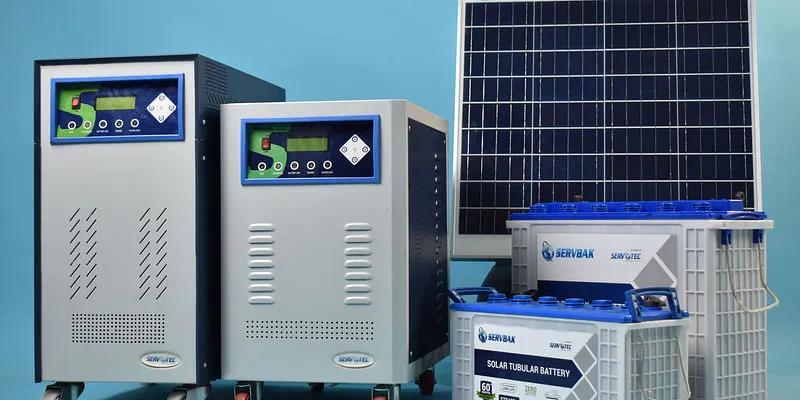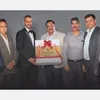Starting from a TV repair business, this entrepreneur built a Rs 135 Cr turnover green tech company
Raman Bhatia started his entrepreneurial journey in 1991 and laid the foundation stone for Servotech Power Systems. In a span of over 30 years, he has built an NSE-listed Rs 135 cr turnover company engaged in the manufacturing, procurement and distribution of solar products, medical devices etc.
Raman Bhatia (now 45), founder of Servotech Power Systems Pvt Ltd, began his entrepreneurial journey in 1991. However, he did not choose the relatively easy path of joining a well-established family business.
Instead, at age 15, Raman was working odd jobs. Three decades later, he runs an NSE listed company involved in end-to-end manufacturing, procurement and distribution of a range of advanced solar products, medical devices as well as energy-efficient lighting solutions.
The company recently moved into the EV (electric vehicle) market with the launch of high-tech EV charging equipment.
In an interview with SMBStory, Raman shares the story behind Servotech and his thoughts on sustainability.
A self-made man
Despite hailing from a strong family business background in cycle manufacturing, Raman decided to forge his own path to success.
From working in an electronics repair shop to selling newspapers and even riding rickshaw, Raman tried all kinds of jobs.
In the early 90s, after completing his graduation, Raman began pursuing a job at Videocon as he wanted to explore the electronics industry. However, after seeing the salary bracket offered, he was disappointed and didn’t go through the interview process. He says,
“While I was sitting at the office waiting for my turn to come I just walked up to the receptionist to understand what is the highest salary the company gives to the employee. (Usne ek aadmi ki taraf ishara kiya aur kaha unki salary sabse zyada hai) She pointed at the man saying his salary is the highest and he would get Rs 8,200 per month. So I just thought to myself - will my growth be restricted to getting only eight thousand? I packed my stuff and left the office.”
Raman had a strong interest in electronics and had gained experience working in an appliance repair shop. He requested his father to give him a small space at his shop to start a TV repair business. His father agreed and Raman started his work.
This was in the year 1991.
Raman then forayed into making stabilisers. Back then, the cost of inverters prevented consumers—even retail store owners—from buying them. He then put his skills to use, and with the help of his friends, developed an inverter.
This was the stepping stone in his business journey. Because the product just ‘made by chance’ led him to discover newer business opportunities.
“Whoever came to our shop was fascinated by that small inverter box and my friends would just take it away saying they needed it in their shop. I then made another but during the process, I thought that this could be a good business. I then started making inverters for selling purposes and sold it at Rs 8,000 per piece.”
By 1994, Raman had made Rs 30 lakhs which he says was the biggest milestone not just for him but for his entire family.
“That day I felt that my decision to not pursue the job was for the better,” he says.

Servotech's solar product range
Business expansion via technology inclusion
Raman’s hot-selling inverters gave him the motivation to do the business in a systematic way and he opened his own shop by the name Bhatia Electronics in Sultanpuri New Delhi. However, life doesn’t always go as per the plan and to Raman’s dismay, all the inverters he had sold a year earlier started failing.
However, he quickly took technology transfer from an institute in Kochi to make better inverters. He then launched a new inverter range under the brand Servotech.
From the mid-90s onwards, Raman started expanding his business. By 1996, he surpassed his father’s business in terms of revenue and in 2003, set up the firm by the name Servotech Power Systems Pvt Ltd., moving towards the corporate side of the business.
Between 2004 and 2006, Raman entered the retail business joining hands with BigBazaar, Spencers, Croma, More and banking institutions like Kotak, HDFC, and others to deploy his inverters, stabilisers and also UPS which he had also developed by then.
“The business was running smoothly but in 2008 recession hit India. That time everyone was on ‘money saving’ mode and no one wanted to spend even a penny on anything. I tried to capitalise on the opportunity by bringing in products that would help companies save power, in turn save money and thus I forayed into LED (light emitting diode) and VFD (variable frequency drive).”
This expansion opened new opportunities for Raman and since then there is no looking back.
By 2014 Servotech partnered with the government to install UPS in schools and Raman says he also partnered with governments from states of (now) Telangana, Assam, Himachal Pradesh, Uttar Pradesh and others to install solar roof tops.
“I delved deeper into the categories of my business and was making enough money to sustain but there’s one thing that I constantly asked myself - what next and why for? Then I thought to do something for the environment and expanded the business into green energy and now my mission is to make this planet green to improve the living and thus I forayed into solar in 2014 itself,” he says.
Servotech has also incorporated the country's first portable solar rooftop system, which was inaugurated in April at the Swaminarayan Akshardham temple complex in Gandhinagar, Gujarat. Raman says the same project is under progress in Akshardham Temple in New Delhi. According to Raman, these lamps are installed both in India and countries abroad in public places. In India, these lamps could be seen at Golden Temple, Amritsar, Ram Mandir in Ayodhya, and more.
In 2022, Servotech forayed into EV chargers and tied up with UK-based companies to develop local EV charging machines. Raman claims that the company has its chargers put up in a few petrol pumps of Indian Oil, Bharat Petroleum, and Hindustan Petroleum.
Saving lives through oxygen concentrators
Amid the second wave of the pandemic, Raman had to go through the struggle of finding oxygen concentrators for one of his friends who was critical with COVID-19. While he was able to arrange for the one, the quality of that concentrator shocked him.
“That oxygen concentrator was a life supporting machine for that patient but its quality was the worst. Seeing the shortage around and the quality available, I tried to talk to people in my contacts looking for something we could do,” Raman tells SMBStory.
Raman then got in touch with IIT Jammu and DRDO (Defence Research Development Organisation) to make oxygen concentrators for critically ill patients in 2021 itself. The 5 litre oxygen concentrator produces 5 LPM oxygen and is instrumental in providing a 24 hour continuous supply of oxygen.
Raman also developed UV-C light amid the 2020 pandemic through a one million Euro grant. The UV-C handheld disinfection lamp is a rechargeable and portable germicidal device designed to ensure quick and effective sanitisation by striking 99 percent of the viruses and germs to make surfaces clean, germ-free, and sterilised.
The market scenario and way forward
According to IBEF, the Indian renewable energy sector is the fourth most attractive renewable energy market in the world. As India looks to meet its energy demand on its own, which is expected to reach 15,820 TWh by 2040, renewable energy is set to play an important role. The government plans to establish a renewable energy capacity of 523 GW (including 73 GW from Hydro) by 2030.
Raman wants to tap into this opportunity as he says, “jane se pehle kuch accha karke jana hai (before leaving, I have to do something that would create an impact).” Though he also talks about the challenges of technology adoption and finding manpower, he ends the interview saying that he aims Servotech to play a strong role in producing more green energy to live green.
Edited by Affirunisa Kankudti








